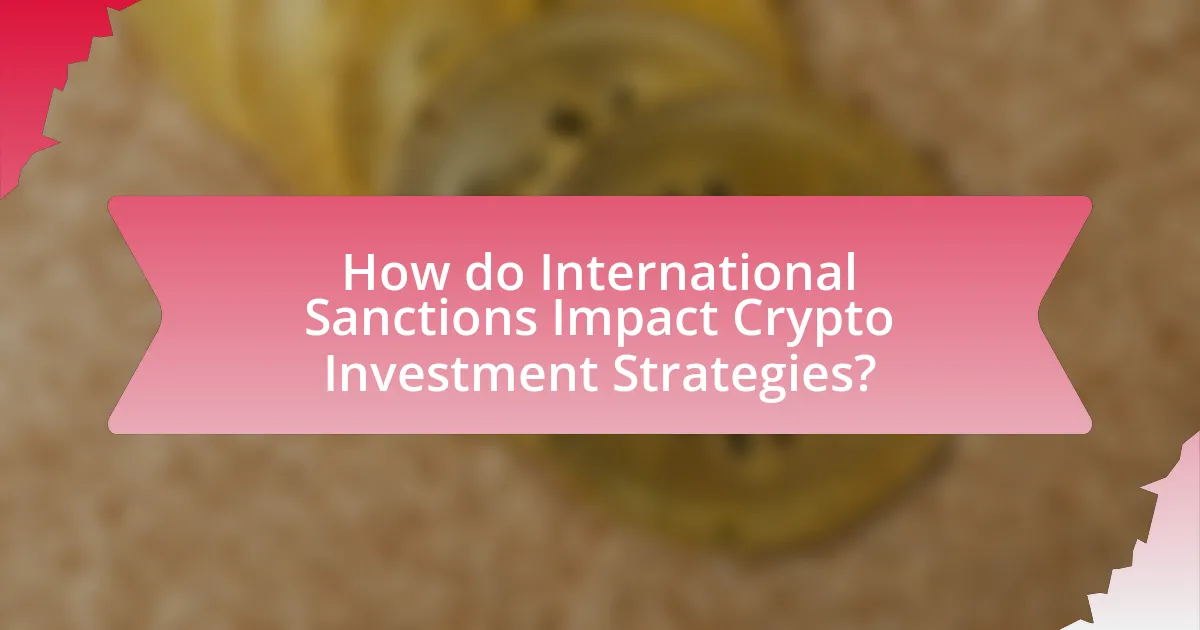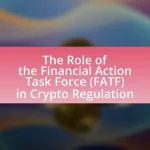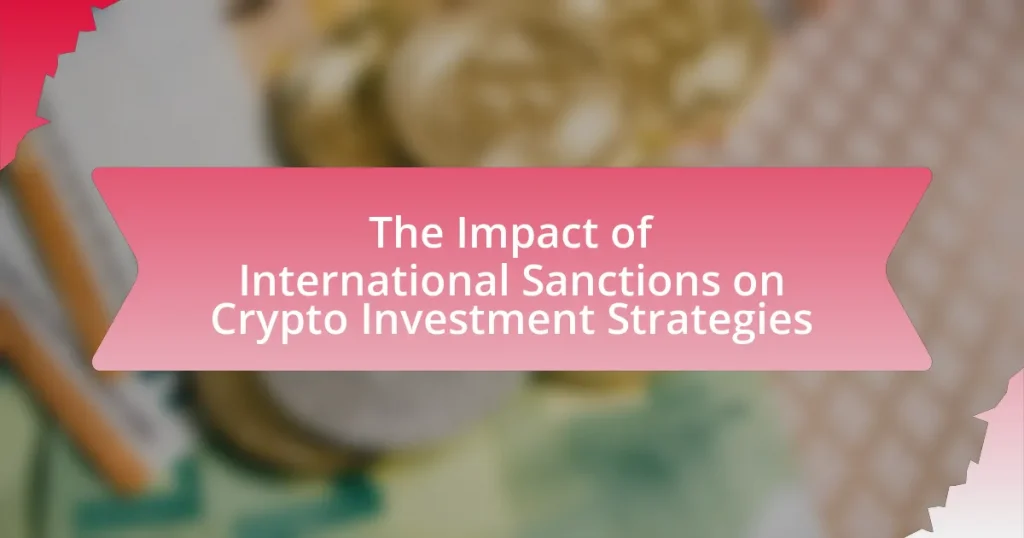International sanctions are restrictive measures imposed by countries or organizations to influence the behavior of targeted nations, groups, or individuals, often related to human rights abuses, terrorism, or nuclear proliferation. This article examines the impact of international sanctions on global economies, detailing how they disrupt trade and investment, and explores the various types of sanctions commonly imposed. It highlights the relationship between sanctions and cryptocurrency, illustrating how individuals and entities in sanctioned countries increasingly turn to digital currencies to circumvent financial restrictions. Additionally, the article discusses the challenges investors face due to sanctions, strategies for mitigating risks, and the future implications of evolving sanctions on crypto investments. Key resources for staying updated on sanctions and cryptocurrency are also provided.

What are International Sanctions and Their Purpose?
International sanctions are restrictive measures imposed by countries or international organizations to influence the behavior of a target nation, group, or individual. Their primary purpose is to compel compliance with international laws or norms, deter undesirable actions, or punish violations, often related to issues like human rights abuses, terrorism, or nuclear proliferation. For instance, the United Nations has implemented sanctions against North Korea to curb its nuclear weapons program, demonstrating how sanctions can serve as a tool for international diplomacy and security.
How do international sanctions affect global economies?
International sanctions negatively impact global economies by disrupting trade, investment flows, and financial markets. For instance, sanctions imposed on countries like Iran and North Korea have led to significant reductions in their GDP, with estimates showing Iran’s economy contracted by over 6% in 2018 due to sanctions. These measures create uncertainty in international markets, leading to decreased foreign direct investment and increased volatility in commodity prices. Additionally, sanctions can lead to a reallocation of resources, as countries seek alternative trading partners, which can further distort global economic dynamics.
What types of sanctions are commonly imposed?
Commonly imposed sanctions include economic sanctions, trade sanctions, diplomatic sanctions, and military sanctions. Economic sanctions restrict financial transactions and trade, often targeting specific sectors or entities, as seen in the sanctions against Iran that limit its oil exports. Trade sanctions prohibit or restrict trade with specific countries, exemplified by the U.S. embargo on Cuba. Diplomatic sanctions involve the reduction or severance of diplomatic ties, such as the expulsion of diplomats, which occurred during the Russia-Ukraine conflict. Military sanctions may include arms embargoes, like those imposed on North Korea to prevent the proliferation of weapons. These sanctions aim to influence the behavior of nations or entities by applying economic and political pressure.
Why are certain countries targeted by sanctions?
Certain countries are targeted by sanctions primarily due to their involvement in activities that threaten international peace and security, such as terrorism, human rights violations, or nuclear proliferation. For instance, the United Nations and various countries have imposed sanctions on North Korea in response to its nuclear weapons program, which poses a significant threat to regional and global stability. Additionally, countries like Iran have faced sanctions due to their support for terrorism and violations of international agreements, such as the Joint Comprehensive Plan of Action (JCPOA). These sanctions aim to compel the targeted nations to alter their behavior by restricting access to international markets and financial systems.
What is the relationship between international sanctions and cryptocurrency?
International sanctions often drive individuals and entities to utilize cryptocurrency as a means to circumvent financial restrictions. Sanctions imposed by governments, such as those from the United States or the European Union, limit access to traditional banking systems and financial markets, prompting affected parties to seek alternative methods for transactions. For instance, countries like Iran and North Korea have increasingly turned to cryptocurrencies to facilitate trade and access funds, as these digital assets can operate outside conventional financial systems. This relationship highlights how cryptocurrencies can serve as tools for evading sanctions, evidenced by reports indicating a rise in crypto transactions in sanctioned nations, which underscores the growing intersection between international sanctions and the use of digital currencies.
How do sanctions influence the adoption of cryptocurrencies?
Sanctions significantly accelerate the adoption of cryptocurrencies by individuals and entities seeking to circumvent financial restrictions. When traditional banking systems are restricted due to sanctions, such as those imposed on countries like Iran and Venezuela, cryptocurrencies provide an alternative means for conducting transactions and preserving value. For instance, a report by Chainalysis in 2021 highlighted that countries under heavy sanctions saw increased cryptocurrency transactions, with Iran reportedly using cryptocurrencies to facilitate trade and evade sanctions. This trend illustrates how sanctions can drive the demand for decentralized financial systems, as they offer a way to bypass traditional financial infrastructures that are often controlled by sanctioning entities.
What role do cryptocurrencies play in circumventing sanctions?
Cryptocurrencies serve as a tool for circumventing sanctions by enabling peer-to-peer transactions that are difficult to trace and control. Their decentralized nature allows individuals and entities in sanctioned countries to conduct financial transactions without relying on traditional banking systems, which are often subject to regulatory oversight. For example, in 2020, reports indicated that North Korea utilized cryptocurrencies to fund its missile programs, demonstrating how digital currencies can facilitate illicit activities despite international sanctions. Additionally, the use of privacy coins, such as Monero, further obscures transaction details, making it challenging for authorities to enforce sanctions effectively.

How do International Sanctions Impact Crypto Investment Strategies?
International sanctions significantly influence crypto investment strategies by restricting access to traditional financial systems and encouraging the use of cryptocurrencies as alternative assets. Sanctions often lead investors in sanctioned countries to seek decentralized financial solutions, resulting in increased demand for cryptocurrencies like Bitcoin and Ethereum. For instance, after the imposition of sanctions on Russia in 2022, there was a notable surge in crypto trading volumes within the country, indicating a shift towards digital assets to circumvent financial restrictions. This trend demonstrates that international sanctions can drive innovation and adaptation in investment strategies, as investors look for ways to maintain liquidity and access to global markets despite regulatory barriers.
What challenges do investors face due to sanctions?
Investors face significant challenges due to sanctions, primarily including restricted access to markets and financial systems. Sanctions often limit the ability of investors to conduct transactions with entities in sanctioned countries, leading to reduced investment opportunities and increased compliance costs. For instance, the U.S. sanctions against Iran have severely restricted foreign investment in its oil sector, resulting in a decline in potential returns for investors. Additionally, sanctions can create uncertainty and volatility in markets, making it difficult for investors to assess risks accurately. This uncertainty can deter investment and lead to capital flight, as seen in countries like Venezuela, where sanctions have led to economic instability and diminished investor confidence.
How do sanctions affect market volatility in cryptocurrencies?
Sanctions increase market volatility in cryptocurrencies by creating uncertainty and limiting access to financial resources. When countries face sanctions, their ability to engage in international trade and finance diminishes, leading to heightened speculation and price fluctuations in the cryptocurrency market. For instance, the sanctions imposed on Russia in 2022 resulted in significant price swings for Bitcoin and other cryptocurrencies, as investors reacted to the geopolitical tensions and potential shifts in demand. This volatility is further exacerbated by the decentralized nature of cryptocurrencies, which can lead to rapid price changes in response to news related to sanctions.
What risks are associated with investing in crypto under sanctions?
Investing in crypto under sanctions poses significant risks, including legal repercussions, market volatility, and restricted access to financial services. Legal repercussions arise because engaging in transactions with sanctioned entities can lead to severe penalties, including fines and imprisonment, as governments enforce compliance with sanctions. Market volatility is heightened due to the speculative nature of cryptocurrencies, which can lead to rapid price fluctuations that may result in substantial financial losses. Additionally, restricted access to financial services can occur as banks and payment processors may refuse to facilitate transactions involving sanctioned individuals or entities, limiting liquidity and investment opportunities. These risks underscore the complexities of navigating the crypto market in a sanctioned environment.
What strategies can investors adopt in response to sanctions?
Investors can adopt diversification and risk assessment strategies in response to sanctions. Diversification involves spreading investments across various assets and geographic regions to mitigate risks associated with specific sanctions. For instance, during the 2014 sanctions against Russia, investors shifted their portfolios to include assets in more stable markets, reducing exposure to affected regions. Additionally, conducting thorough risk assessments allows investors to evaluate the potential impact of sanctions on their holdings, enabling informed decisions about asset allocation. Historical data shows that investors who proactively adjusted their strategies during geopolitical tensions often experienced less volatility and better long-term returns.
How can diversification mitigate risks from sanctions?
Diversification can mitigate risks from sanctions by spreading investments across various assets, sectors, and geographic regions, thereby reducing exposure to any single point of failure. When investors diversify their portfolios, they can lessen the impact of sanctions imposed on specific countries or industries, as losses in one area may be offset by gains in another. For instance, during the sanctions against Russia in 2014, investors who had diversified their holdings across different markets and asset classes were better positioned to absorb the financial shocks compared to those heavily invested in Russian assets. This strategy not only protects against localized risks but also enhances overall portfolio resilience in the face of geopolitical uncertainties.
What role does regulatory compliance play in investment strategies?
Regulatory compliance is crucial in shaping investment strategies as it ensures adherence to legal frameworks, thereby mitigating risks associated with non-compliance. Investment firms must align their strategies with regulations to avoid penalties, maintain investor trust, and ensure market integrity. For instance, the implementation of the Financial Action Task Force (FATF) guidelines on anti-money laundering (AML) and counter-terrorism financing (CTF) has compelled crypto investors to adopt compliance measures, influencing their investment decisions and operational frameworks. This compliance not only protects firms from legal repercussions but also enhances their reputation in a rapidly evolving market, ultimately impacting their strategic positioning and investment outcomes.

What are the Future Implications of Sanctions on Crypto Investments?
Future implications of sanctions on crypto investments include increased regulatory scrutiny and potential market volatility. As governments impose sanctions, they may target crypto exchanges and wallets associated with sanctioned entities, leading to a tightening of compliance requirements. For instance, the Financial Action Task Force (FATF) has emphasized the need for crypto platforms to adhere to anti-money laundering (AML) regulations, which could limit access for users in sanctioned countries. Additionally, historical data shows that sanctions can lead to a flight of capital from traditional financial systems to cryptocurrencies, creating price fluctuations and liquidity challenges. This dynamic suggests that investors must navigate a more complex landscape, balancing the potential for high returns against the risks of regulatory backlash and market instability.
How might evolving sanctions shape the cryptocurrency landscape?
Evolving sanctions are likely to drive increased adoption of cryptocurrencies as alternative financial systems emerge to circumvent traditional banking restrictions. As countries face sanctions, they may turn to cryptocurrencies to facilitate trade and maintain economic stability, evidenced by nations like Iran and Venezuela utilizing digital currencies to bypass financial barriers. This shift could lead to a more decentralized and diverse cryptocurrency ecosystem, as users seek privacy and security in their transactions, ultimately influencing regulatory frameworks and market dynamics globally.
What trends are emerging in crypto investment strategies due to sanctions?
Emerging trends in crypto investment strategies due to sanctions include increased adoption of decentralized finance (DeFi) platforms and the use of privacy-focused cryptocurrencies. Investors are shifting towards DeFi to bypass traditional financial systems affected by sanctions, enabling them to conduct transactions without intermediaries. Additionally, privacy coins like Monero and Zcash are gaining traction as they offer enhanced anonymity, making it difficult for authorities to trace transactions. This shift is evidenced by a rise in trading volumes for these assets, particularly in regions facing stringent sanctions, highlighting a strategic pivot in response to regulatory pressures.
How can investors prepare for potential changes in sanctions?
Investors can prepare for potential changes in sanctions by diversifying their portfolios and staying informed about geopolitical developments. Diversification reduces risk by spreading investments across various assets, which can mitigate the impact of sanctions on specific sectors or regions. For instance, during the 2014 sanctions on Russia, investors who had diversified into non-Russian assets experienced less volatility. Additionally, monitoring news from reliable sources such as government announcements and financial news outlets helps investors anticipate changes in sanctions and adjust their strategies accordingly. This proactive approach enables investors to respond swiftly to new regulations, thereby protecting their investments.
What best practices should investors follow when navigating sanctions?
Investors should conduct thorough due diligence to ensure compliance with sanctions when navigating international restrictions. This involves researching the specific sanctions applicable to the countries or entities involved in their investments, as well as understanding the legal implications of engaging with sanctioned parties. For instance, the U.S. Office of Foreign Assets Control (OFAC) maintains a list of sanctioned individuals and entities, which investors must regularly consult to avoid legal repercussions. Additionally, investors should implement robust compliance programs that include monitoring transactions for potential sanctions violations and training staff on relevant regulations. By adhering to these best practices, investors can mitigate risks associated with sanctions and protect their investment strategies in the crypto market.
How can due diligence help in making informed investment decisions?
Due diligence helps in making informed investment decisions by systematically evaluating potential investments to identify risks and opportunities. This process involves analyzing financial statements, market conditions, and regulatory compliance, which is crucial in the context of international sanctions that may affect crypto investments. For instance, a study by the Financial Action Task Force (FATF) highlights that thorough due diligence can reveal how sanctions impact the liquidity and legality of crypto assets, enabling investors to avoid assets that may be subject to restrictions or penalties. By conducting due diligence, investors can make decisions based on comprehensive data, thereby minimizing the likelihood of financial loss and ensuring compliance with legal frameworks.
What resources are available for staying updated on sanctions and crypto?
Key resources for staying updated on sanctions and cryptocurrency include government websites, financial news outlets, and specialized blockchain analysis platforms. Government websites such as the U.S. Department of the Treasury’s Office of Foreign Assets Control (OFAC) provide official updates on sanctions. Financial news outlets like Bloomberg and Reuters report on developments in both sanctions and cryptocurrency markets. Additionally, platforms like Chainalysis and Elliptic offer insights into how sanctions affect crypto transactions, providing data analytics and compliance tools. These resources collectively ensure that investors and stakeholders remain informed about the evolving landscape of sanctions and their implications for cryptocurrency investments.















